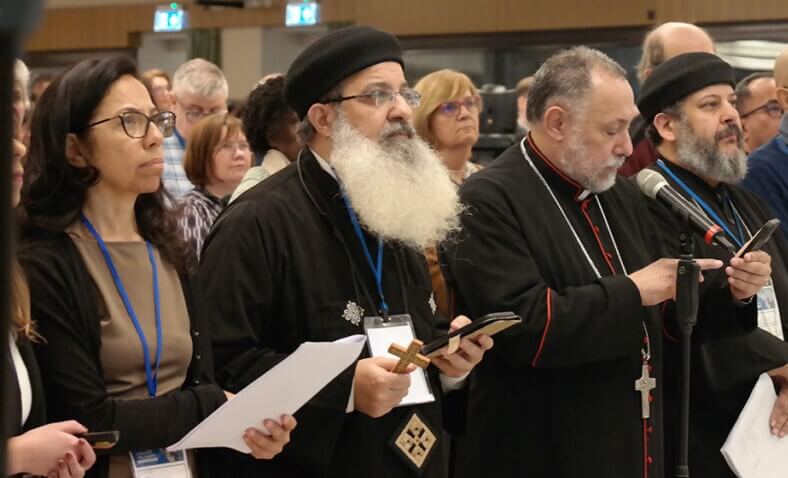Ecumenical Conference “Called to Hope – key players of dialogue”

Heike Vesper
The year 2025 is full of significant anniversaries for all of Christendom. This jubilee year of the Catholic Church with its theme of Pilgrims of Hope reflects 1700 years since the Council of Nicaea, 60 years since the abolition of mutual excommunications between the Church of Rome and the Church of Constantinople (December 1965), and 100 years since the first ecumenical Faith and Constitution Conference in Sweden in 1925. Moreover, it is not mere coincidence that Christians from East and West celebrated Easter on the same date this year. Rather it appears as a prophetic sign, a “divine” witness together to unity in an increasingly fractured and polarized world. Not surprisingly, one publication even described it as the courage to proclaim that Jesus unites1.
From March 26-29, 2025, the ecumenical conference Called to Hope – Key Players of Dialogue was held in Castel Gandolfo, Italy. It was sponsored by the international secretariat of the Focolare Movement for Christian Unity, “Centro Uno”. There were more than 250 participants, belonging to 20 Christian Churches and some 40 countries, including Brazil, Cameroon, Congo, Egypt, the Philippines, Great Britain, Ireland, Lebanon, Russia, Serbia, Slovakia, USA, Ukraine, and Venezuela. There were simultaneous translations in 14 languages, with eight streamed in order to connect four thousand live listening points2 worldwide.
“Today, more than ever, in the world in which we live, so full of divisions, tragedies, conflicts, where people struggle to dialogue, coming together has a very great meaning,” said Margaret Karram, the president of the Focolare Movement, in an interview published in Vatican News.
To deepen and actualize the above-mentioned historical events, Msgr. Andrea Palmieri, undersecretary of the Dicastery for the Promotion of Christian Unity, and Prof. Dr. Martin Illert, representative of the Ecumenical Council of Churches, spoke, with historical reflections offered by Drs. Sandra Ferreira (Catholic) and Mervat Kelli (Syrian Orthodox) of “Centro Uno” and Dr. Kostas Mygdalis (Greek Orthodox).
The conference, opened by Jesús Morán, co-president of the Focolare Movement, and Callan Slipper, an Anglican theologian, posed the central question: Does Christian unity still have urgency in today’s world? Morán had no doubt about this, saying: “Unity rather than union, and Christianity as a way of being rather than doctrine, can be two fruitful paths for ecumenism, in response to what history demands of us today. In the face of the world’s great challenges, division among Christians is inappropriate, inconvenient, anachronistic, and even scandalous.” Similarly, Callan Slipper affirmed: “Ecumenism, by repairing our personal interactions within the Christian community, allows the Church to be itself. What serves humanity also serves us. Our spiritual health diminishes without it, just as every other dimension of human life cannot reach its fulfillment without the reconciliation brought by Jesus.”
Methods for a path to unity were shared in a dialogue of life, dialogue of the people, and receptive ecumenism used in theological dialogue. According to Presbyterian pastor Karen Petersen Finch, lecturer at Montréal Presbyterian University, there is a need for lay people to also dialogue about doctrines still dividing the churches. Mutual knowledge opens horizons and keeps the desire for unity alive.3
These reflections were complemented by accounts of many ecumenical initiatives involving churches, priests and laity, theologians and scholars, adults and youth, individuals and groups. Speakers included: Dr. Natasha Klukach from the Global Christian Forum , a video message from Dr. William Wilson (Pentecostal World Fellowship); the ecumenical youth training program “Ikumenì “4 in Latin America; and the ecumenical network Together for Europe. Likewise, national initiatives such as the Catholic-Pentecostal dialogue Somus Um in Brazil and the John 17 movement (USA) were also presented, while Msgr. Derio Olivero, president of the CEI Episcopal Commission for Ecumenism, outlined ecumenical activities in Italy. Testimonies from the Philippines, Northern Ireland, Serbia, the Netherlands, Venezuela, Germany and Uganda were also presented.
An in-depth look at synodality and ecumenism through the testimony of five participants of the Synod of the Catholic Church: fraternal delegates Archbishop Khajag Barsamian (Armenian Apostolic Church), Rev. Dirk G. Lange (Lutheran World Federation) and Dr. Elizabeth Newman (Baptist World Alliance), Msgr. Brendan Leahy (Catholic Bishop of Limerick-Ireland) and Focolare president Margaret Karram. Their experience of the Synod and the fraternal relationships which had been built were contagious and prophetic for a vision of the One Church.
On the second day, a pilgrimage to the Rome Basilica of St. Lawrence Martyr and the Abbey of the Three Fountains – which tradition situates as the place of the martyrdom of St. Paul – was an encounter with the first martyrs of the undivided Church. By their authenticity of life and faith and their witness, they instilled the courage to proclaim Christ today. Then, the pilgrimage concluded with an ecumenical prayer for reconciliation and peace at the Basilica of St. Paul Outside the Walls.
Many echoes afterwards spoke of the fruits of the conference, of offering an experience of fraternity “in presence” and thus one of mutual knowledge. Participants also spoke of the challenging richness of diversity that gave new inspiration and renewed hope, all serving as fuel in becoming protagonists in dialogue in every sphere.
1 L’Osservatore Romano del 28 March2025.
2 The program is still available on the Focolare Movement’s YouTube channel:
https://youtube.com/playlist?list=PLKhiBjTNojHqagL3wOalryEL0CqjEjWpy&feature=shared
3 He wrote a book about this experience with the title Grassroots ecumenism published by New City Press.
4 Cf. B. Isola, Ikumèni. Un laboratorio di formazione al dialogo e alla diaconia, in «Ekklesía» 6 (2023/1) n. 18, p. 60.
Men and Women: Together
April to June 2025
No 27 – 2025/2